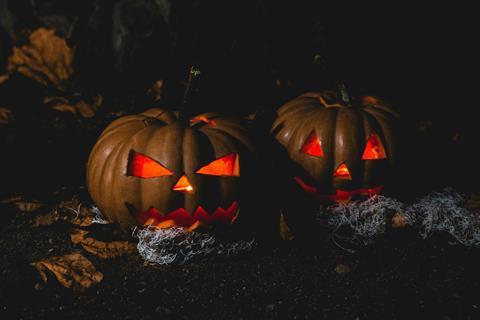Hope Bonarcher is concerned that many parents don’t think seriously enough about the dark background to Halloween

Some stories are downright eerie, even when they’re biblical:
At the beginning of time, a perfect couple lived in a fruitful garden. Their all sufficient, loving father walked alongside them. One day, an uninvited third party revealed himself, ruining their paradise by cunningly convincing them to doubt their father’s identity and goodness. Sin entered the couple and all their offspring. The man and woman were banned from the garden. In mercy and kindness, their father continued to bless them, but their unintended alliance with his enemy’s inferior, still formidable authority, left them perpetually gripped by warring evil entities and death.
Western believers may be less comfortable with talk of demonic supernatural forces, but the Bible isn’t silent
Try as we might to stave off scary stuff as Christians, we have to admit, it’s woven into the fabric of our origins. Good-evil, light-darkness, life-death; we can’t separate from the root of who we are as humans, but we can control our focus and intent. Western believers may be less comfortable with talk of demonic supernatural forces, but the Bible isn’t silent. The Apostle Paul wrote in Ephesians 6:12, “For we do not wrestle against flesh and blood, but against the rulers, against the authorities, against the cosmic powers over this present darkness, against the spiritual forces of evil in the heavenly places.”
Around the world and for millennia, since that heave-ho from the garden, ancient cultures have had a history of seeking power and understanding the world around them through contact with and worship of supernatural beings. Polytheism (the belief in or worship of more than one god) was practiced by everyone from the ancient Greek’s, with Poseidon, god of the sea; to Viking dieties like Odin, god of thunder and protector of humanity; to the West African Yoruba religion where they worshiped Orishas like Oshun, goddess of love and rivers. Humanity has long turned to created sources (physically or supernaturally speaking) to meet its felt needs. These created things, imbued with demonic power (like that snake in Eden), inspired belief and worship in people, apart from God almighty.
in 1 Samuel 15:23, the Bible relates witchcraft with rebellion
There’s no direct translation in Hebrew for witchcraft, but in 1 Samuel 15:23, the Bible relates witchcraft with rebellion. Generally defined, witchcraft is the activity of performing magic (influencing events through mysterious or supernatural forces) to help or harm people. Many practices commonly associated with witchcraft are condemned in scripture. Fortune telling, sorcery, interpreting omens, casting spells, functioning as mediums or psychics, and calling forth the spirits of the dead; these practices involve seeking wisdom, direction, or leverage from sources separate from the sovereign God, hence the term rebellion. Those in rebellion sought to secure a place of dominion apart from God, outside the garden.
Remember Abram. In Genesis 12, God called him out from his father’s people, to parts unknown. Abram’s father, Terah, was a Chaldean, his people lived in ancient Mesopotamia, known as modern day Iraq. Later associated with the Babylonian Empire, the Chaldeans were also polytheistic and practiced idolatry and divination. For a holy, set apart God, to establish a new beginning from Abram, he also needed to be set apart from his rebellious relations. God changed his name to Abraham, “father of multitudes,” his obedience made him known as the father of the faithful (Romans 4:16).
The Witchtok hashtag has over 20.7 billion views on TikTok, and 1/5 of Brits prefer Halloween to Christmas
We think of Great Britain and Ireland as civilized, Christian nations, but before the faith reached British shores, people were just as steeped in rebellious witchcraft practices as Terah’s Chaldeans. The ancient Celts practiced polytheism and Animism, the belief that natural objects like trees, rivers and animals had divine power. They performed animal and human sacrifices to their gods and their shamanic priests were called Druids.
This same ancient group, of Irish and Scottish origin, celebrated the festival of Samhain (pronounced Sah-win), the original root of Halloween. This festival was held at the end of the harvest season, the day before their November 1st new year. They believed the boundary between tangible and supernatural realms dimmed at Samhain, inviting plentiful visitations from “spirits, ghosts and fairies”. As some of these ethereal forces were malevolent, they covered their faces in ash, wore masks, and dressed their children in costumed disguises for protection. Archeological evidence points to human sacrifices made during Samhain to honor Celtic gods, and they lit bonfires to honor ancestors or deter evil spirits.
Read more:
What The Celebrity Traitors reveals about the human heart — and why Christian parents should care
Should Christian families celebrate Halloween? The case against
Should Christian families celebrate Halloween? The case for
10 ways Christian parents can provide an alternative Halloween for children with additional needs
When the Romans conquered much Celtic territory in Britain, their polytheistic traditions melded. Pope Gregory the VI moved All Hallows Day, a day to commemorate dead loved ones, martyrs, and saints, to November the 1st. All Hallow’s Eve, October 31st, would come to be called Halloween. It’s thought many centuries later, Irish and Scottish people emigrating to America, brought along their Celtic traditions. Bonfires were set and neighbourhood children were encouraged to light rubbish and refuse, perhaps tying in with the idea of fires to ward off the dead. One woman, frustrated by the yearly destruction of her flowerbeds by mischievous children, organized a neighbourhood gathering to show off their costumes. This is how the modern community practice of Halloween came about in the 19th century.
Today, witchcraft and Halloween are big business. The Witchtok hashtag has over 20.7 billion views on TikTok, and 1/5 of Brits prefer Halloween to Christmas. You don’t need to be an influencer to witness the wider cultural embrace of godlessness and rebellion. Halloween and its historic association with occult, witchcraft practices here at its source, sets off Holy Spirit alarm bells in the hearts of many British believers. An informal survey of my own Christian mom friends, revealed the majority steer clear of any association with the holiday. Who’s more familiar with the scourge of rebellion than mothers? The last thing we hope to do is encourage it.
Anton LaVey, author of ‘The Satanic Bible’, called Halloween one of the three most important holidays for satanists and witch and Wiccan priestess
Aspects of Halloween, like demonic spirits being more in touch with the living, traditional colors of black (death) and orange (autumn), carving pumpkins (originally turnips) to ward off evil spirits, dressing up in costumes to confuse intimidating elements, and an overall preoccupation with the dead, all come from the ritualistic Celtic celebration of Samhain, which to this day, is celebrated by witches and satanists enamored with its origins. Anton LaVey, author of ‘The Satanic Bible’, called Halloween one of the three most important holidays for satanists and witch and Wiccan priestess, Doreen Valiente, a foundational influence on modern day Wicca wrote, “To witches, Halloween is a serious occasion, however merrily celebrated. It is the old Celtic Eve of Samhain.” Of the many ex witches and satanists turned Christians I’ve heard, not one endorses celebrating Halloween.
As humans, it’s true, our origins are tied up with death and dark forces, but we need not fear. For believers, reconciliation, not rebellion, is our inheritance. We worship Jesus, Light of the World (John 9:5), the Resurrection and the Life (John 11:25), who conquered death and the grave (Rev 1:18) and gives us access to the full armor of God to stand against the devil (Eph. 6:11). One day He will return to create a new heaven and new earth, in the middle of that heavenly city will be a garden. Those who repent from evil through faith in Christ alone will dwell there. That’s always something worth celebrating.































